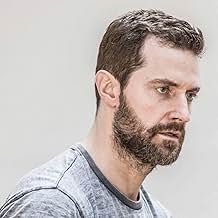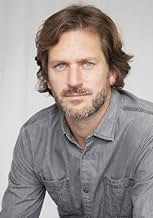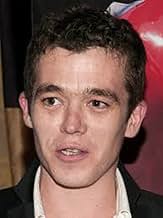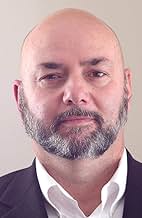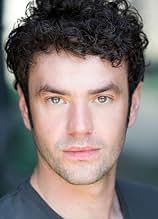IMDb RATING
5.9/10
7.2K
YOUR RATING
In 13th-century Ireland, a group of monks must escort a sacred relic across a landscape fraught with peril.In 13th-century Ireland, a group of monks must escort a sacred relic across a landscape fraught with peril.In 13th-century Ireland, a group of monks must escort a sacred relic across a landscape fraught with peril.
- Awards
- 1 win & 3 nominations total
Akilas Karazisis
- The Killer
- (as Akillas Karazisis)
Gaëtan Wenders
- Fournier
- (as Gaetan Wenders)
- Director
- Writer
- All cast & crew
- Production, box office & more at IMDbPro
5.97.1K
1
2
3
4
5
6
7
8
9
10
Featured reviews
An exciting and evocative medieval movie about group of monks who must escort a sacred relic across a dangerous landscape.
A grim and atmospheric film set in 'Dark ages' with noisy action, pursuits, fights and lots of violence. In Middle Age one young monk along with other reckless pals will take on an impressive pilgrimage and will fight against evil. Ireland, 1209. Far from the chaos of the Crusades, a small, quiet group of Catholic monks protect an ancient and powerful relic. However, the object must travel to Rome, as it is required by papal authority, and must be escorted by its protectors, to help the Church in its fight against the infidels. Escorting their monastery's holiest relic to Rome, the monks' progress is seen through the eyes of a pious young novice (Tom Holland), a mute lay-brother (Jon Brenthal) with a violent past and other peculiar priests (Hugh O'Conor, John Lynch, Stanley Weber), all of them go throughout a landscape fraught with peril. This pilgrimage will not be easy, because along the way they will encounter Norman invaders, bloody native tribes and all kinds of unimaginable dangers.
This breathtaking picture packs great loads of action, mystery , twists and turns, overwhelming combats and a little bit of gore and blood. Including stunning battles scenes illuminating the full-blown adventure with a plethora of engaging action set pieces on the thrilling fights. This Middle Age adventure movie deals with a reluctant pilgrimage across an island torn between centuries of tribal warfare and the growing power of Norman invaders, being exceptionally and colorfully cinematographed on location, mostly in Ireland. Beginning with a real sense of wonder including some flashbacks regarding the origin of the holy relic and following with chases, treason, ravage and winding up with continuous struggles and a surprising final. This thought-provoking story deals with God , Devil , Catholic Church and several other 'Age of Darkness' issues. The monks belatedly realize that in this wild land of ancient superstitions, the faith that binds them together may ultimately lead to their destruction. Showing the everlasting and vital value of relics in the time of the Middle Ages, in this case the stone that killed the apostle Saint Matthias while he was apostolate Christian followers in Cappadocia. As the true material, political and religious significance of the bejeweled relic becomes dangerously apparent, their path to the east coast becomes increasingly fraught with danger.
Beautiful scenery, tense and bloody fights and a stirring climax lift this story. This above average and well-directed movie stars Tom Holland (the same year he led his first film for the Marvel Universe: 'Spiderman: Homecoming') who plays a very young monk who will soon discover the savagery that hides behind religious fervour, along with Jon Brenthal, who's pretty good giving life to a silent and mysterious assistant to the monks and he is more than he seems. Completing the cast are: Richard Armitage, John Lynch, Stanley Weber and Hugh O'Connor. The film was nominated for best photography and best costumes at the Irish film and television awards.
Being competently photographed by cameraman Tom Comerford on various locations in Connemara, County Galway, Clonbur, County Galway, County Mayo, Ireland, Roscommon, Ireland, Ardennes, Wallonia, Belgium and Greece. The camera work by Comerford in this film is moving and thrilling. Furthermore, musical score by composer Stephen McKeon is sensitive and spectacular. The motion picture was professionally directed by Brendan Muldowney , though with no originality because we have already seen the pursuit premise of the film in other similar stories. Brendan is an expert filmmaker of all kinds of genres with penchant for horror; known for The Ten Steps (2004), Savage (2009) , Love Eternal (2013), Pilgrimage (2017), The Cellar (2022) , among others . Rating : 7/10. A notable and decent historical film. The picture will appeal to Tom Holland fans. There's something for everyone here ; fans of history , fans of action, fans of medieval adventure should all find something to enjoy about this film. It may not be the best film ever made, but its still one attractive movie.
This breathtaking picture packs great loads of action, mystery , twists and turns, overwhelming combats and a little bit of gore and blood. Including stunning battles scenes illuminating the full-blown adventure with a plethora of engaging action set pieces on the thrilling fights. This Middle Age adventure movie deals with a reluctant pilgrimage across an island torn between centuries of tribal warfare and the growing power of Norman invaders, being exceptionally and colorfully cinematographed on location, mostly in Ireland. Beginning with a real sense of wonder including some flashbacks regarding the origin of the holy relic and following with chases, treason, ravage and winding up with continuous struggles and a surprising final. This thought-provoking story deals with God , Devil , Catholic Church and several other 'Age of Darkness' issues. The monks belatedly realize that in this wild land of ancient superstitions, the faith that binds them together may ultimately lead to their destruction. Showing the everlasting and vital value of relics in the time of the Middle Ages, in this case the stone that killed the apostle Saint Matthias while he was apostolate Christian followers in Cappadocia. As the true material, political and religious significance of the bejeweled relic becomes dangerously apparent, their path to the east coast becomes increasingly fraught with danger.
Beautiful scenery, tense and bloody fights and a stirring climax lift this story. This above average and well-directed movie stars Tom Holland (the same year he led his first film for the Marvel Universe: 'Spiderman: Homecoming') who plays a very young monk who will soon discover the savagery that hides behind religious fervour, along with Jon Brenthal, who's pretty good giving life to a silent and mysterious assistant to the monks and he is more than he seems. Completing the cast are: Richard Armitage, John Lynch, Stanley Weber and Hugh O'Connor. The film was nominated for best photography and best costumes at the Irish film and television awards.
Being competently photographed by cameraman Tom Comerford on various locations in Connemara, County Galway, Clonbur, County Galway, County Mayo, Ireland, Roscommon, Ireland, Ardennes, Wallonia, Belgium and Greece. The camera work by Comerford in this film is moving and thrilling. Furthermore, musical score by composer Stephen McKeon is sensitive and spectacular. The motion picture was professionally directed by Brendan Muldowney , though with no originality because we have already seen the pursuit premise of the film in other similar stories. Brendan is an expert filmmaker of all kinds of genres with penchant for horror; known for The Ten Steps (2004), Savage (2009) , Love Eternal (2013), Pilgrimage (2017), The Cellar (2022) , among others . Rating : 7/10. A notable and decent historical film. The picture will appeal to Tom Holland fans. There's something for everyone here ; fans of history , fans of action, fans of medieval adventure should all find something to enjoy about this film. It may not be the best film ever made, but its still one attractive movie.
Who is a devil? Who is an angel?
Out of the creeping faerie mist of a dark age comes an intensely suspenseful tale about why we choose our allegiances. This is the heart of the story - our reasons make no sense.
The drama revolves around a lump of rock. That any other lump could replace it at any time and no-one would notice is openly stated in the dialogue. It's the stark question woven through the plot - is faith taken on faith alone really worth fighting for?
It's a tense film, beautifully written and exquisitely acted. Each viewer decides what the film's about - it doesn't explain itself, it falls silent. Everyone will see something different. Some might conclude we're all compelled towards war whether we like it or not. Some might decide we're all in league with the Devil whether we know it or not. Some might believe we're all still lost in the creeping faerie mist clutching for something to save us.
Some reviewers didn't rate it highly as an action thriller but it's not a superficial movie and maybe doesn't fit into that genre. There's far more being shown in the subtext and the themes than being told in the action. As for the excessive violence, I felt it merely conveyed the grim reality of melee combat. After all, hidden in the word 'Pilgrimage' is the word 'grim'.
It's a mark of a brilliant film when after seeing it once you must see it again. On the second viewing, it bit me deeper on the neck and made me more its thrall.
For me, the main highlight was Jon Bernthal's acting. It was haunting. He played a voiceless man who served the monks as the lowliest of their group and I fell in love with his tragic integrity. He reminded me of another tormented anti-hero of contemporary myth - Angel from 'Buffy The Vampire Slayer': the vampire cursed with a soul, plagued by a weight of remorse for a hellish past. Both crave absolution and will do anything to receive it.
I loved 'Pilgrimage'. It was a strangely beguiling hybrid of superstitious medievalism clashing with an ancient landscape alive with pre-existing belief. And the ending was satisfyingly unsatisfying - like all good fairy tales are.
The drama revolves around a lump of rock. That any other lump could replace it at any time and no-one would notice is openly stated in the dialogue. It's the stark question woven through the plot - is faith taken on faith alone really worth fighting for?
It's a tense film, beautifully written and exquisitely acted. Each viewer decides what the film's about - it doesn't explain itself, it falls silent. Everyone will see something different. Some might conclude we're all compelled towards war whether we like it or not. Some might decide we're all in league with the Devil whether we know it or not. Some might believe we're all still lost in the creeping faerie mist clutching for something to save us.
Some reviewers didn't rate it highly as an action thriller but it's not a superficial movie and maybe doesn't fit into that genre. There's far more being shown in the subtext and the themes than being told in the action. As for the excessive violence, I felt it merely conveyed the grim reality of melee combat. After all, hidden in the word 'Pilgrimage' is the word 'grim'.
It's a mark of a brilliant film when after seeing it once you must see it again. On the second viewing, it bit me deeper on the neck and made me more its thrall.
For me, the main highlight was Jon Bernthal's acting. It was haunting. He played a voiceless man who served the monks as the lowliest of their group and I fell in love with his tragic integrity. He reminded me of another tormented anti-hero of contemporary myth - Angel from 'Buffy The Vampire Slayer': the vampire cursed with a soul, plagued by a weight of remorse for a hellish past. Both crave absolution and will do anything to receive it.
I loved 'Pilgrimage'. It was a strangely beguiling hybrid of superstitious medievalism clashing with an ancient landscape alive with pre-existing belief. And the ending was satisfyingly unsatisfying - like all good fairy tales are.
raw and well told
This is very good. far more realistic than Hollywood might produce. it's interesting, much dogma was born of superstition, identifications that without science, were attributed to whatever godly (natural) forces our people believed in at the time. However, belief is a force unto itself and it does serve to manipulate circumstance. that is in here too. well told
Thoroughly enjoyable
Well cast and acted. Visually pleasing and plenty of well performed action. If this is your genre you'll enjoy it
Much better than expected based on its trailer.
PILGRIMAGE (2017)
This is the new film from the Irish director of the excellent 2009 flick called SAVAGE about an assault on a news reporter in Dublin (and it's aftermath) and I gotta say, if Werner Herzog had made this film rather than one about an Amazonian trek he wudda been quite happy.
The film is set in the early 1200s in Ireland where superstition and the struggle for Christian domination of the country are rife and there, an envoy from Rome is sent to collect a supposedly sacred relic from some rural monks and bring it back to the holy city.
The movie is grim, and conveys the horrible conditions people existed/lived in back then perfectly (the bloody weather looks the same as Ireland has now though haha). It's highly atmospheric, with bleak Irish landscapes, and the acting is top notch with the film basically being a dangerous road trip carrying the relic to a ship that's waiting for them in Waterford (to sail across to France and onward to Rome).
The fact that the film is recorded in Irish, French, and English adds a brilliant realism to proceedings which echoes the situation at the time with Ireland being infringed upon from all sides, and along the way things get very messy and bloody (one death is particularly gruesome).
I'm sure there wasn't a huge Hollywood budget for PILGRIMAGE but they've kept things really concentrated and its certainly exceeds what you might expect to be straight to video cheese.
This is the third film I've seen by Brendan Muldowney and I think the guy has some talent. I will be looking out for his next film and if you haven't already caught SAVAGE Id check that out too.
This is the new film from the Irish director of the excellent 2009 flick called SAVAGE about an assault on a news reporter in Dublin (and it's aftermath) and I gotta say, if Werner Herzog had made this film rather than one about an Amazonian trek he wudda been quite happy.
The film is set in the early 1200s in Ireland where superstition and the struggle for Christian domination of the country are rife and there, an envoy from Rome is sent to collect a supposedly sacred relic from some rural monks and bring it back to the holy city.
The movie is grim, and conveys the horrible conditions people existed/lived in back then perfectly (the bloody weather looks the same as Ireland has now though haha). It's highly atmospheric, with bleak Irish landscapes, and the acting is top notch with the film basically being a dangerous road trip carrying the relic to a ship that's waiting for them in Waterford (to sail across to France and onward to Rome).
The fact that the film is recorded in Irish, French, and English adds a brilliant realism to proceedings which echoes the situation at the time with Ireland being infringed upon from all sides, and along the way things get very messy and bloody (one death is particularly gruesome).
I'm sure there wasn't a huge Hollywood budget for PILGRIMAGE but they've kept things really concentrated and its certainly exceeds what you might expect to be straight to video cheese.
This is the third film I've seen by Brendan Muldowney and I think the guy has some talent. I will be looking out for his next film and if you haven't already caught SAVAGE Id check that out too.
Did you know
- TriviaTo prepare for his role, Jon Bernthal spent the first few weeks of shooting completely silent, even when he's not on set.
- GoofsAll entries contain spoilers
- How long is Pilgrimage?Powered by Alexa
Details
- Release date
- Countries of origin
- Languages
- Also known as
- El sacrilegio
- Filming locations
- Production companies
- See more company credits at IMDbPro
Box office
- Budget
- €4,749,500 (estimated)
- Gross worldwide
- $23,689
- Runtime
- 1h 36m(96 min)
- Color
- Sound mix
- Aspect ratio
- 2.35 : 1
Contribute to this page
Suggest an edit or add missing content



